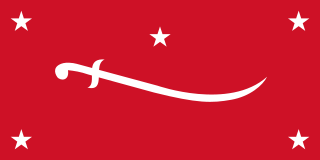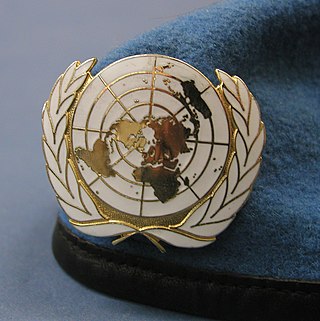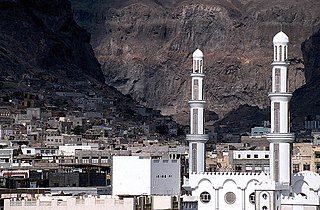
The United Nations Security Council (UNSC) is one of the six principal organs of the United Nations (UN) and is charged with ensuring international peace and security, recommending the admission of new UN members to the General Assembly, and approving any changes to the UN Charter. Its powers as outlined in the United Nations Charter include establishing peacekeeping operations, enacting international sanctions, and authorizing military action. The UNSC is the only UN body with authority to issue resolutions that are binding on member states.

The member states of the United Nations comprise 193 sovereign states. The United Nations (UN) is the world's largest intergovernmental organization. All members have equal representation in the UN General Assembly.
China is one of the members of the United Nations and is one of five permanent members of its Security Council. One of the victorious Allies of World War II, the Republic of China (ROC) joined the UN as one of its founding member countries in 1945. The subsequent resumption of the Chinese Civil War between the government of Republic of China and the rebel forces of the Chinese Communist Party, led to the latter's victory on the mainland and the establishment of the People's Republic of China (PRC) in 1949. Nearly all of mainland China was soon under its control and the ROC government retreated to the island of Taiwan.

United Nations Security Council Resolution 678 was adopted on 29 November 1990. After reaffirming resolutions 660, 661, 662, 664, 665, 666, 667, 669, 670, 674 and 677, the council noted that despite all the United Nations efforts, Iraq continued to defy the Security Council.

The Committee on the Exercise of the Inalienable Rights of the Palestinian People (CEIRPP) is a committee mandated by the United Nations General Assembly in order to promote the rights of the Palestinian people, support the peace process and to mobilize assistance to the Palestinian people.

The United Nations General Assembly Resolution 194 is a resolution adopted near the end of the 1947–1949 Palestine war. The Resolution defines principles for reaching a final settlement and returning Palestine refugees to their homes. Article 11 of the resolution resolves that
refugees wishing to return to their homes and live at peace with their neighbours should be permitted to do so at the earliest practicable date, and that compensation should be paid for the property of those choosing not to return and for loss of or damage to property which, under principles of international law or equity, should be made good by the Governments or authorities responsible.

The United Nations General Assembly Resolution 2758, also known as the Resolution on Admitting Peking, was passed in response to the United Nations General Assembly Resolution 1668 that required any change in China's representation in the UN be determined by a two-thirds vote referring to Article 18 of the UN Charter. The resolution, passed on 25 October 1971, recognized the People's Republic of China (PRC) as "the only legitimate representative of China to the United Nations" and removed "the representatives of Chiang Kai-shek" from the United Nations.

North Yemen is a term used to describe the Kingdom of Yemen (1918-1962), the Yemen Arab Republic (1962-1990), and the regimes that preceded them and exercised sovereignty over that region of Yemen. Its capital was Sanaa from 1918 to 1948 and again from 1962 to 1990. Located in the southwestern part of the Arabian Peninsula, the area of the region is 195,000 square kilometers, it used to have a population of about thirteen million people prior to the Yemeni unification. It was bordered to the north by Saudi Arabia, to the south and east by South Yemen, to the west by the Red Sea, and to Bab al-Mandab in the southwest.

As of 23 January 2025, there are 193 member states in the United Nations (UN), each of which is a member of the United Nations General Assembly.

The United Nations has played an advisory role in maintaining peace and order in the Kashmir region soon after the independence and partition of British India into the dominions of Pakistan and India in 1947, when a dispute erupted between the two new States on the question of accession over the princely state of Jammu and Kashmir. India took this matter to the UN Security Council, which passed resolution 39 (1948) and established the United Nations Commission for India and Pakistan (UNCIP) to investigate the issues and mediate between the two new countries. Following the cease-fire of hostilities, it also established the United Nations Military Observer Group in India and Pakistan (UNMOGIP) to monitor the cease-fire line.

United Nations General Assembly Resolution 273 was adopted on May 11, 1949, during the second part of the third session of the United Nations General Assembly, to admit the State of Israel to membership in the United Nations. It was passed following the approval of UN Security Council Resolution 69 on March 4, 1949.

United Nations Security Council Resolution 47, adopted on 21 April 1948, concerns the resolution of the Kashmir conflict. After hearing arguments from both India and Pakistan, the Council increased the size of the UN Commission created by the former Resolution 39 to five members, instructed the Commission to go to the subcontinent and help the governments of India and Pakistan restore peace and order to the region and prepare for a plebiscite to decide the fate of Kashmir.
The United Nations Peacekeeping efforts began in 1948. Its first activity was in the Middle East to observe and maintain the ceasefire during the 1948 Arab–Israeli War. Since then, United Nations peacekeepers have taken part in a total of 72 missions around the globe, 12 of which continue today. The peacekeeping force as a whole received the Nobel Peace Prize in 1988.

United Nations Security Council Resolution 243, adopted unanimously on 12 December 1967, after examining the application of the People's Republic of Southern Yemen for membership in the United Nations, the Council recommended to the General Assembly that the People's Republic of Southern Yemen be admitted.

The presidency of the United Nations Security Council is responsible for leading the United Nations Security Council. It rotates among the fifteen member-states of the council monthly. The head of the country's delegation is known as the president of the United Nations Security Council. The presidency has rotated every month since its establishment in 1946, and the president serves to coordinate actions of the council, decide policy disputes, and sometimes functions as a diplomat or intermediary between conflicting groups.

United Nations Security Council resolution 931, adopted unanimously on 29 June 1994, after recalling Resolution 924 (1994) on the civil war in Yemen, the Council considered the findings of the fact-finding mission deployed to the country and demanded a ceasefire.
Pakistan officially joined the United Nations (UN) on 30 September 1947 just over a month after it came into existence. Today, it is a charter member and participates in all of the UN's specialised agencies and organisations. Pakistan has been elected seven times into the UN Security Council, with the most recent term in 2025. It is also one of the countries which has had a diplomat, Muhammad Zafarullah Khan, serve a term as the President of the United Nations General Assembly.

The United Nations General Assembly resolution 498 was approved on February 1, 1951, in response to the intervention of Chinese Communist troops in Korean War.
International reactions to the Saudi-led intervention in Yemen of 2015 were mixed. Most other Arab League nations and several Western governments backed the Saudi Arabia-led military coalition, but other governments warned against an escalation in the violent situation in Yemen.

The United Nations General Assembly Resolution 500 was approved on May 18, 1951, recommending a trade embargo on the People’s Republic of China and North Korea, in response to the intervention of Chinese troops in Korean War.













